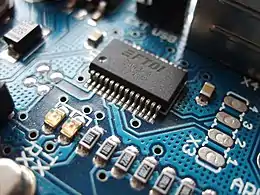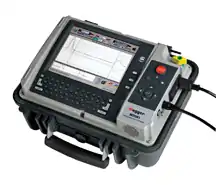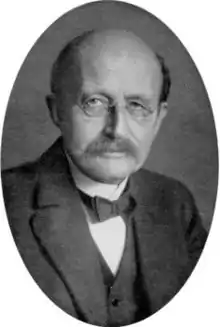The Electronics Portal Modern surface-mount electronic components on a printed circuit board, with a large integrated circuit at the top Electronics is a scientific and engineering discipline that studies and applies the principles of physics to design, create, and operate devices that manipulate electrons and other electrically charged particles. Electronics is a subfield of electrical engineering, but it differs from it in that it focuses on using active devices such as transistors, diodes, and integrated circuits to control and amplify the flow of electric current and to convert it from one form to another, such as from alternating current (AC) to direct current (DC) or from analog to digital. Electronics also encompasses the fields of microelectronics, nanoelectronics, optoelectronics, and quantum electronics, which deal with the fabrication and application of electronic devices at microscopic, nanoscopic, optical, and quantum scales. Electronics have a profound impact on various aspects of modern society and culture, such as communication, entertainment, education, health care, industry, and security. The main driving force behind the advancement of electronics is the semiconductor industry, which produces the basic materials and components for electronic devices and circuits. The semiconductor industry is one of the largest and most profitable sectors in the global economy, with annual revenues exceeding $481 billion in 2018. The electronics industry also encompasses other sectors that rely on electronic devices and systems, such as e-commerce, which generated over $29 trillion in online sales in 2017. (Full article...)
|
|
|
Main topics
Electronics - Consumer electronics - Engineering - Manufacturing - Symbols - Units - Waste
Theory: Ampère's law - Coulomb's law - Frequency - Hall effect - Joule's laws - Kirchhoff's laws - Millman's Theorem - Moore's Law - Norton's theorem - Ohm's law - Peukert's law - Resistance - Thévenin's theorem- Superposition - Wavelength
Components: Antenna - Capacitor - Connectors - Diode - Fuse - Ground - Inductor - Integrated circuit - LCD - Magnetron - Memristor - Phased array - Printed circuit board - Resistor - Thermocouple - Transformer - Transistor - Switch - Wire
Circuits: AC - Bridge - Designs - Diagrams - DC - Impedance - Load - Series and parallel - Voltage divider - Voltage drop
Fields: Avionics - Computer systems - Control systems - Electromechanics - Microelectronics - Optoelectronics - Power - Quantum electronics - Radio - Robotics - Semiconductors - Spintronics - Telecommunications
Products: Cameras - Computers - Fiber optics - Lasers - Lights - Mobile phones - Printed circuit board - Radios - TVs
Companies: AMD - Apple - Bose - Canon - Cray - Dell - Fujitsu - Garmin - HP - IBM - Intel - JVC - Kyocera - LG - Microsoft - Motorola - NEC - Nintendo - Philips - Pioneer - RadioShack - Samsung - Siemens - Sirius - Sony - Texas Instruments - Xerox
People: Ampère - Becquerel - Bell - Coulomb - Edison - Einstein - Faraday - Gauss - Geiger - Hall - Henry - Hertz - Joule - Kirchhoff - Marconi - Moore - Ohm - Ørsted - Planck - Siemens - Tesla - Volta - Watt - Weber
Subcategories
Associated Wikimedia
The following Wikimedia Foundation sister projects provide more on this subject:
-
 Commons
Commons
Free media repository -
 Wikibooks
Wikibooks
Free textbooks and manuals -
 Wikidata
Wikidata
Free knowledge base -
 Wikinews
Wikinews
Free-content news -
 Wikiquote
Wikiquote
Collection of quotations -
 Wikisource
Wikisource
Free-content library -
 Wikiversity
Wikiversity
Free learning tools -
 Wiktionary
Wiktionary
Dictionary and thesaurus
-
 List of all portals
List of all portals -

-

-

-

-

-

-

-

-

-
 Random portal
Random portal -
 WikiProject Portals
WikiProject Portals





.png.webp)







